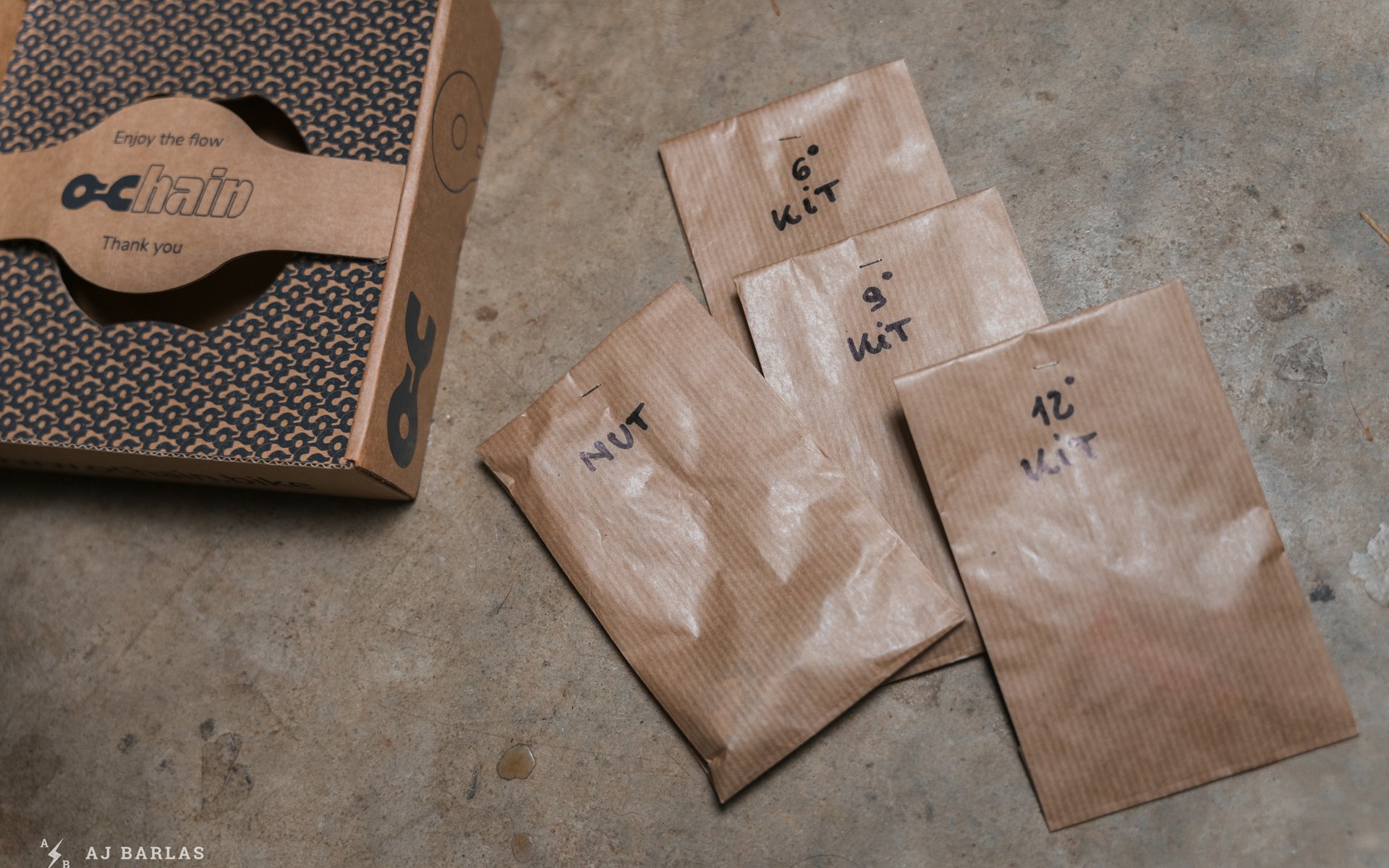
Editorial
Less Plastic, More Impressed
As a young fella, I remember learning about recycling and realizing how important it was. But as the decades have passed, it doesn't feel like much has changed. I've become increasingly aware of how much plastic there is in our lives and it’s pretty well unavoidable. It’s as if recycling, and plastic in particular, gave companies carte blanche to produce more, rather than avoiding a need to recycle at all. Today, there’s more plastic in use than there was when I first learnt of recycling, which I find baffling.
Years after first learning to recycle, I started working in a bike shop. We were taught to recycle cardboard packaging from the bikes but the plastic and poly-foam were thrown in the garbage. It never sat well with me and on more than one occasion, I raised the issue with peers only to be shut down because of the time required to sort that out. A few years later, after a brief hiatus from shop life, I found myself back in bike shops dealing with the same issue, this time here in Canada.
It’s a tricky situation because people need to work and businesses need to turn a profit, and for many, that means saving money where possible. Plastic must be cheaper to use for packaging because it’s used everywhere today. It's also used in abundance to manufacture many of the products we buy and use daily.

I was impressed by this Sri Lankan farmer's use of plastic bottles, of which there's an abundance in Ella. Inside there were more used throughout the walls. It's great to see it being put to use, in a country where many toss single use packaging to the ground.

Yet, across the valley from the farm, from a wide view, the intense beauty of this naturally stunning location hides the rubbish. It's a shame that somewhere so gorgeous hides so much plastic. If it weren't used to begin with, would we be in a better place?
The invasive nature of plastic really dawned on me when a friend of Tim Coleman’s shared the story of a project he and his family were taking part in. They were to live without plastic for a short period, removing everything made with the material from their home. They quickly realized there wouldn’t be much in the house, let alone a structure if all of the plastic were removed.
Eliminating all plastic from existence isn’t feasible at this point but we can cut back on its use. Plastic in packaging is an area I feel we can improve, and often this type is already rubbish, or not far from it. It's an unfortunate truth about recycling; it’s not infinite and eventually arrives at a point where the material becomes garbage.

Upon first look, the packaging doesn't appear wildly different. Many companies use cardboard to box their products.
Examples of Less Plastic in Packaging Exist
In recent years consumers have been bombarded with greenwashing tactics but when an obvious effort has been made to avoid using plastic, it stands out. If this isn't accompanied by a marketing blurb pushing this environmental perspective, it carries greater meaning – actions speak louder than words, after all. OChain is the latest I've encountered and a great example. I've not noticed the small Italian company mentioning their view when it comes to environmental practices but when I received their Active Spider for review – which is coming very soon – their packaging caught my attention.
As I dove deeper into the contents it became clear; after stumbling upon the small parts in paper bags, I realized this was a conscious effort. I had to do a double-take, checking back through each part of the package before allowing myself to believe what I was seeing. It would have been easy for OChain to use plastic bags to (unnecessarily) cover the spider, or store the small parts, or even where they've used wood and a bolt with a wingnut to secure everything, but they haven't.

Still no plastic. At this point I expected to find some for the small parts…

The first thing that caught me off-guard was the use of wood, a bolt and wing-nut to hold the spider together.
OChain's packaging is a great example of how brands can avoid plastic in their packaging. Sure, it's still a consumable product and the cardboard/paper packaging still needs to go somewhere but for me, it's the lesser of two evils. Brands making a concerted effort to remove plastic from their products and packaging will help reduce our environmental impact.

But finding all of the small parts in paper bags? That's not something I expected to see from a bike company.
We've previously mentioned how YT and Canyon use less plastic in the packaging of their bikes, leading me to believe there are others considering this. Revel also claims to send their bikes to consumers in reusable Evoc bike bags, which can be returned at Revel's expense, or kept if the customer prefers. How much these practices improve upon traditional packaging is yet to be proven, but I believe it’s better than continuing to use a heap of plastic. I find the unnecessary use of plastic in packaging disgusting. On a positive note, much of the bike world doesn't seem as bad as tech – look at the amount of shitty plastic on 'high end' Apple products, as an example – but we can do better.
As consumers, trying to avoid plastic is virtually impossible because of its ubiquitous use and I'm not convinced our governments will do enough to help this initiative. Single-use plastics are under fire in a few places around the world but movements seem to be targeted mostly toward plastic shopping bags and straws when many more items fit the category. Without consumers pushing brands and governments to do better, we can expect to continue seeing excessive plastic and overuse of packaging in general. Scientists are already seeing plastic in our food, and what was previously a series of growing ocean garbage patches filled with plastic, are now showing up on shorelines around the world. Until its use is cut back dramatically, expect to see more of it floating ashore.
As consumers, we have some power. Examining the products we purchase and choosing those with less plastic can make a difference. Choose the product made or packaged with less plastic. Do tires need to come with a plastic hang tag? Do we even need hang tags? Helmets and chains don't need boxes with shitty plastic 'windows.' Alternatives exist, often post-consumer alternatives, and the more support consumers give to brands striving to do better, the more things will change.











Comments
cornedbeef
4 years, 1 month ago
Personally, I think the biggest step the industry would need is Shimano and SRAM to eliminate plastic from their packing material. They supply drivetrains for most bikes, and will make the largest single difference. Imagine all Shimano components that come in those clear bags that CRC customers and OEMs receive. Calculating the amount of waste from that particular subset is mind-boggling, and that doesn't include the plastic bags in the retail packaging.
The second step is SRAM to eliminate the SX rear derailleur all together, as an injection-molded plastic 12 speed clutch derailleur will always be a bad idea. Its intentional use of plastic as a form of planned obsolescence (particularly in the cycling industry) in such a vital component symbolically perpetuates a "throwaway" society and may encourage smaller manufacturers of this vile philosophy.
Calculating the amount ofplastic used per bicycle for packaging, and finding cardboard alternatives would be interesting. Santa Cruz packages bikes in a very unique way I'd personally like to see other companies to emulate, which is far more cardboard-intensive than the usual "front wheel on the NDS and foam bits in between and around". I've seen some interesting cardboard jointed structures in their recent Heckler packaging that helps diffuse the energy and avoids the usage of foam.
Reply
Lu Kz
4 years, 1 month ago
> The second step is SRAM to eliminate the SX rear derailleur all together, as an injection-molded plastic 12 speed clutch derailleur will always be a bad idea. Its intentional use of plastic as a form of planned obsolescence (particularly in the cycling industry) in such a vital component symbolically perpetuates a "throwaway" society and may encourage smaller manufacturers of this vile philosophy
Fuckin' A-men. I swear these things were designed to grenade once a rider starts putting serious miles down so they'll upgrade to a GX level component.
This year Trek has eliminated a crazy amount of foam in the packaging on their Marlin series bikes. It's almost entirely paper and cardboard. I personally wouldn't want their minimalist execution on some of the higher end stuff but considering where Trek is selling the lion's share of bikes, it's a big step in the right direction.
Reply
Vik Banerjee
4 years, 1 month ago
It's always a bit sad to see some burly outdoor gear product meant to be used and abused in pretty extreme conditions packaged like it's a Fabergé egg. Less plastic is great. Smaller/minimal packaging is also great even if it's made of paper/cardboard.
Reply
bushtrucker
4 years, 1 month ago
Great article. One suggestion I would make is if you receive a product that has excessive/unnecessary plastic (or even cardboard) packaging then you should reach out to the manufacturer or supplier with that feedback. I’ve had some really great responses in the past from companies, especially smaller ones, who are open to improving their practices. And the more we communicate our preferences as consumers the more motivation businesses will have to change!
Reply
ackshunW
4 years, 1 month ago
Great article! Yes, the stats on the acceleration of the planetary use of plastic is insane. And, no, the utility and use of plastic in modern life is basically unavoidable——— but use of plastic single use packaging is one CLEAR area we should all stop tolerating! Even if stamped with some note about “recyclable”, there’s about a 0.5% chance your local municipality can sort it appropriately. Nice work Ochain!
Still not convinced about what Ochoa’s does for riding, but I’m looking forward to the review.
Reply
MuscogeeMasher
4 years, 1 month ago
This is especially important given that much less of the stuff we put in our recycling bins is actually getting recycled these days.
Reply
Skooks
4 years, 1 month ago
That's great. PNW also do a great job with their recyclable packaging.
Reply
Cr4w
4 years, 1 month ago
The pile of packaging waste you're left with after installing a new drivetrain and brakes is shameful. Surely we can do better. I understand there is a need for components to be stored and protected in a standardized shape for practical shipping concerns but surely we can do without so much plastic. It should be possible for components to be fully secured in a cardboard box with only a single exterior layer of cellophane for moisture protection.
Reply
mrbrett
4 years, 1 month ago
Also, focusing on high volume product would be nice too. I mean, I was pleasantly surprised at how little packaging was surrounding recent King headset purchase. But King headsets and Ochain spiders are relatively boutique items compared to the entry level product.
How has a company like Crappy Tire not figured out how to do reusable packaging? Think of the material cost, environmental burden, and time cost (per unit) for a huge company like that!
Reply
Bikeryder85
4 years, 1 month ago
Late to the comment party, but this is a great article. The hypocrisy in our "green" sport is astounding. I was very pleased when I purchased my pnw grips that they came in all cardboard recyclable packaging. The drink market with plastic bottles is mind boggling. Here in the USA everybody wants to beat the drum of electric cars, but forget about all of the waste that their batteries etc generate. They also ignore things like bottles for drinking. Companies used to use glass, but have all moved to plastic. Real change could occur in our environment if we would focus on single-use plastics instead of other frivolous pseudo environmentalism that solves no real world problem. Sometimes I feel like that we as a society come up with some of these measures to make us feel better about not tackling the problem that would cause us an inconvenience... Getting rid of single-use plastics would help but boy we love our bottled water.
Anyway, that long rant to say this: great article and I wish more companies in the industry would recognize this issue and tackle it head on, if enough companies get on board real change could happen.
Reply
Merwinn
4 years, 1 month ago
As we all know, EVs are seen an important step to reducing CO2 emissions and air quality issues because this can have an effect at a fairly granular household level. In addressing the used EV battery issue there is a notable re-purposing program in Oz to lower demand peaks and help phase out coal-fired peaker plants for farms and manufacturing, VW also has a pilot program for its existing eGolfs, and McKinsey points out that by 2030 there will be a significant market for used Li-Ion batteries. It's encouraging to see there is a secondary market for EV batteries instead of the literal dump.
As an aside, my pet peeve is consumer dental products. The amount of single-use, non-recyclable plastics products is jaw dropping.
Reply
Pete Roggeman
4 years, 1 month ago
Amen. Bottled water is the biggest joke. Google 'the ten thousand dollar sandwich' and be blown away at how stupid it really is. Bad for the environment, expensive, almost always tastes like shit, and less regulated than the water that comes out of your tap.
Reply
The Chez
4 years, 1 month ago
Agreed, ryder. It's not just the waste that EV creates but also the toxic nature of car accidents when there's a bad wreck. Yes, we need to find something different, but we also need to accept that humans are massive consumers of resources. Pick a resource and be a dick about it I suppose?
Reply
mrbrett
4 years, 1 month ago
I think companies like Intend are on a good path - I've heard when you buy stuff from them it comes surrounded by dish sponges instead of foam. Reusable!
Maybe if the packaging were more easily adaptable that would help. I have antique wood crates that I use to hold records, more durable and reusable containers would be a decent alternative too.
Reply
John Keiffer
4 years, 1 month ago
I hate staples.
Reply
Michael Klein
4 years, 1 month ago
I wonder what Ride Wrap is made of? It would be kind of ironic, if the commercial leading up to the video is for a product made of plastic.
Reply
Perry Schebel
4 years, 1 month ago
raw aluminum frames for the win? wrapping a (non recyclable) carbon frame with plastic is like, the worst.
but yeah, i applaud the initiative towards less packaging, and eliminating plastics as much as possible (in general).
speaking of which (random) i'm digging tru earth laundry strips; kinda brilliant. no plastic packaging, very small (concentrated) form factor (reduced transport costs). i love innovative solutions like this.
Reply
The Chez
4 years, 1 month ago
Great article AJ! Indeed, people need to step up and be concerned about our impact. I think about electric vehicles and how that's just passing the buck. But, get in a car from the 1950's and there's very little plastic in it and 70 years later they're still running. I also think of shoes and the massive amounts of waste that come with them. I'm glad to see companies like adidas tackle that issue but at the high end of the cost spectrum it's on the affluent to grab the torch. I will definitely consider companies like this who reduce their plastic with their packaging.
Reply
Please log in to leave a comment.